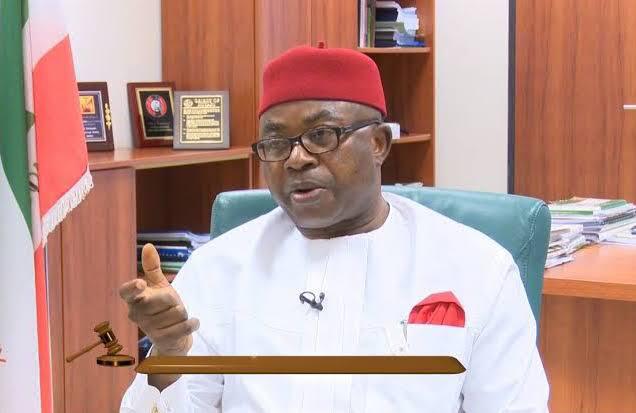Council on Climate Change Act elevated Nigeria’s position globally
Hon. Samuel Ifeanyi Onuigbo, Chairman, House of Representatives Committee on Climate Change and Vice President, Globe International, in this interview with Leo Sobechi, speaks on the benefits of the Climate Change Law and Nigeria’s mileage in the race to net zero carbon emission.
Do you think the climate change law, which you propelled, has any positive bearing on the nation?
I think so. The reason is that Mr. President graciously assented to that bill. I sponsored that bill in the 8th Assembly, but it was denied assent by the same President MuhammaduBuhari.
However, in the 9th Assembly, when I re-sponsored it, to the glory of God, after addressing the concerns he raised, he assented to the bill on November 17, 2021, thereby making it an Act of the National Assembly.
And then, what makes it very important is that Mr. President assented to that bill just about one week after he had returned from COP26 in Glasgow, Scotland, where he made profound commitment to climate change issues. So, it just happened that from a legislative angle, we were able to match the lofty declarations of Mr. President with legislation to enable us move in a particular direction.
I am happy to assert that he has inaugurated the National Council on Climate Change, which is a creation of the Act. That national council on climate change is the highest policy making body on the issues of climate change and it is going to be chaired by Mr. President, or, in his absence, the vice president. Representatives of so many other ministries, including Environment, Agriculture, Judiciary, Water Resources, Mines, Petroleum and Transportation will be in the Council.
The Council also incorporates members from the private sector, representatives of, maybe, Manufacturers Association of Nigeria (MAN). They are going to nominate someone to be recommended by the Minister in the Ministry of Industry, for the President to approve.
And then, the youths, women, people with disability and the Civil Societies have representatives. In fact, it cuts across the board. So, it is a huge representation. That way, whatever policies formulated or agreed upon by the Council will be very easily and seamlessly communicated to these other different layers
The chairman of Nigeria Governors Forum is also a member and also the President of Association of Local Government Councils, the National Security Adviser, the Central Bank of Nigeria (CBN) governor and others. All these people are members of the Council.
Climate change is not something that is restricted to the Presidential Villa or the Federal Capital Territory (FCT). As a matter of fact, it starts even from the sub-national, from the Local Council areas, where people fell trees, where they get involved in illegal mining and refining of fuel. For instance, in Rivers State, you see black soot all over the place. People even engage in activities that hasten deforestation like where they fell trees without replanting. Of course, coming with that is drought and desertification. So, climate change activities come directly from the subnational area. That is why you have this broad membership.
Mr. President has inaugurated that council and it has held its first meeting, I think, in February. And all these people were present charting a course and providing measures. This way, you are now going to have properly coordinated activities on how to go about things.
I think it is going to help in making solid progress and we are happy that we, as a nation, are moving in a particular direction. I don’t have any doubt whatsoever that achieving this and having Mr. President assent to it also elevated the position of Nigeria globally on the actions and steps we are taking towards meeting the Net Zero, as the President promised during COP26, and then being able to meet the target that we set in our nationally-determined contributions, what we refer to as Nationally Determined Contributions (NDC). So, we are moving in a positive direction.
Sometime ago, the President muted the idea of incorporating Commissioners for Environment from the 36 states into the Council. Don’t you think it could make the council so unwieldy and therefore douse the import of the Commission?
I recall that when we were working on the bill, initially, we had this number, even such that we had to add a few more numbers. One of the points raised when Mr. President declined assent, was whether it was unwieldy.
So, in the speech you said Mr. President read and talked about bringing Commissioners for Environment from the states to be part of the Council, the Act does not envisage that, except if there has been an amendment that I am not aware of.
The Act does not envisage that. Why we have the chairman of the Governors Forum is that whatever decisions are taken in respect of what roles the states are supposed to play, the chairman of the NGF is required by the law to convey the same to his colleagues during the Governors’ Forum meeting.
And, we also have the President of the Association of Local Government Council of Nigeria (ALGON) to be able to convey this to members of the 774 councils.
So, a situation where you now bring Commissioners for Environment to be members of the Council even when the Council is about 21 or so, then you add 36 state commissioners, perhaps you should also go ahead and bring the 36 states Commissioners for Water Resources, 36 states Commissioners for Agriculture and the 36 states Commissioners for Transportation.
I think, as you hinted, it is going to be unwieldy and probably douse the import and significance. In fact, the workings of the Council could be jeopardised, because eventually it becomes a talk show. It doesn’t seem to me like it is going to be good that way.
But, you know we make our laws and the executives sometimes come up with amendments. If they come with that amendment, maybe, the 10th Assembly will probably look at it, gauge the merit and then handle that accordingly. Although, in terms of how that is going to work, except if you are saying climate change is going to be restricted to only the Commissioners of Environment, I know it cuts across.
I have talked about petroleum here, I have talked about water resources and these are all interrelated. Maybe, we will find out the kind of advice they are providing to Mr. President, but then, we will see how that plays out. But, in my humble view, I think it is best to allow the Act to be implemented for some time and then see whether there is also a need to bring these huge numbers of people to it.
In spite of all these incremental achievements in the climate change concerns, are you worried by the perception that Nigeria is still indifferent to climate change?
Well, yes, incremental achievements. You could call it that. I also know that the Climate Change Act has really thrown the doors open. Maybe, from some safe distance, you could say that the level of awareness is still very low.
If you go to the Corporate Affairs Commission (CAC) and make enquiry, you will find that Nigerians have actually keyed into that. And they are doing so much in different spheres. For instance, they are doing so much in renewable energy. If you check what has happened with the green bond, they are doing so much in engaging energy transition plans. The Federal Government is very serious about this.
The Nigerian government is focused on clear pathways to emission reduction through the introduction of clean cooking stoves, deep carbonisation in the areas identified as biggest sources of emission, etc. A clear indication of the high level interest in Climate issues was demonstrated on April 4, 2023, when the Vice President, Prof YemiOsinbajo, personally participated in a ceremony where the representatives of the Nigerian Sovereign Investment Authority and Vitol signed a collaboration agreement on Carbon Vista Fund simultaneously linked with climate change, smart-agriculture and the objectives of Nigeria for 2060, valued at $50 million.
Therefore, I will be reluctant to say that the government is not moving in the right direction. However, there is need for massive awareness down to the grassroots so that our people, who fell trees just by being paid little money by some of these foreign nationals that are coming to take away the best of our timber, traditional institutions and local leaders, who take money and fell trees without replanting will know the implications. We must create awareness that they must begin the process of replanting.
Those who also use charcoal as a major source of energy, fire woods as we use in the villages where I come from, we have to really create the needed awareness concerning them. We also have to let them know the health implications. For instance, we use firewood to fry garri and cook other things in the village. I know that these things have serious health implications, particularly, respiratory challenges that equally add to the pressure we experience in the health sector.
So, it is up to us to create awareness, bring clean cooking stoves and distribute them to the rural areas. We should encourage the government as it is working on the distribution of gas, so that we can have them in homes such that we can cook without people being exposed to something harmful to our health.
Therefore, awareness is important. Sensitisation exercises must involve getting the Ministry of Information, National Orientation Agency and similar agencies to key-in, so as to sustain the level that we have attained now in terms of global recognition that Nigeria is moving in the right direction.
That is why in making the Climate Change Act, we included the youths, the women and the Civil Society Organisations, to be able to participate in the Council meetings and be able to convey that to other members of the society. So, we can improve on what we have done so far. That is the way I would like to say it.
Finally, having made this piece of wonderful legislation, what would you suggest as the way forward?
The way forward is, one; to ensure that these clear courses on climate change are taught in our institutions. We included it in the Act that they should involve it in the curriculum.
And, we really have to give it time. From the primary, secondary and the tertiary institutions, these courses should be taught. We can even start from tertiary institutions now and then as we work with the Ministries of Education and the curriculum department, it would be incorporated into our curriculum.
We know that this is an existential threat. It is not something you leave just for men who are in agbada, or those who are wearing Versace suits and walking around as Commissioners and Heads of agencies. No, it has to go down, deep down and capture the interest, the awareness and the commitments of members of the society.
So, that way, we will be able to move forward, but with legislation that encourages these things being taught like we have it in the Act, in schools, in curriculum and then agencies.
And of course, collecting the fines that are there for those who violate the law, they will begin to put these things into action. So, it is not just legislation only, we want to see it properly executed and implemented so as to produce the desired results.
Credit: Guardian





